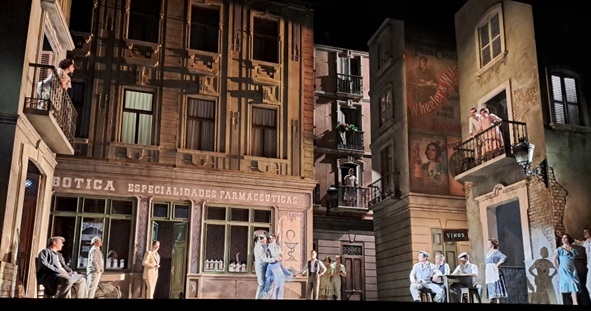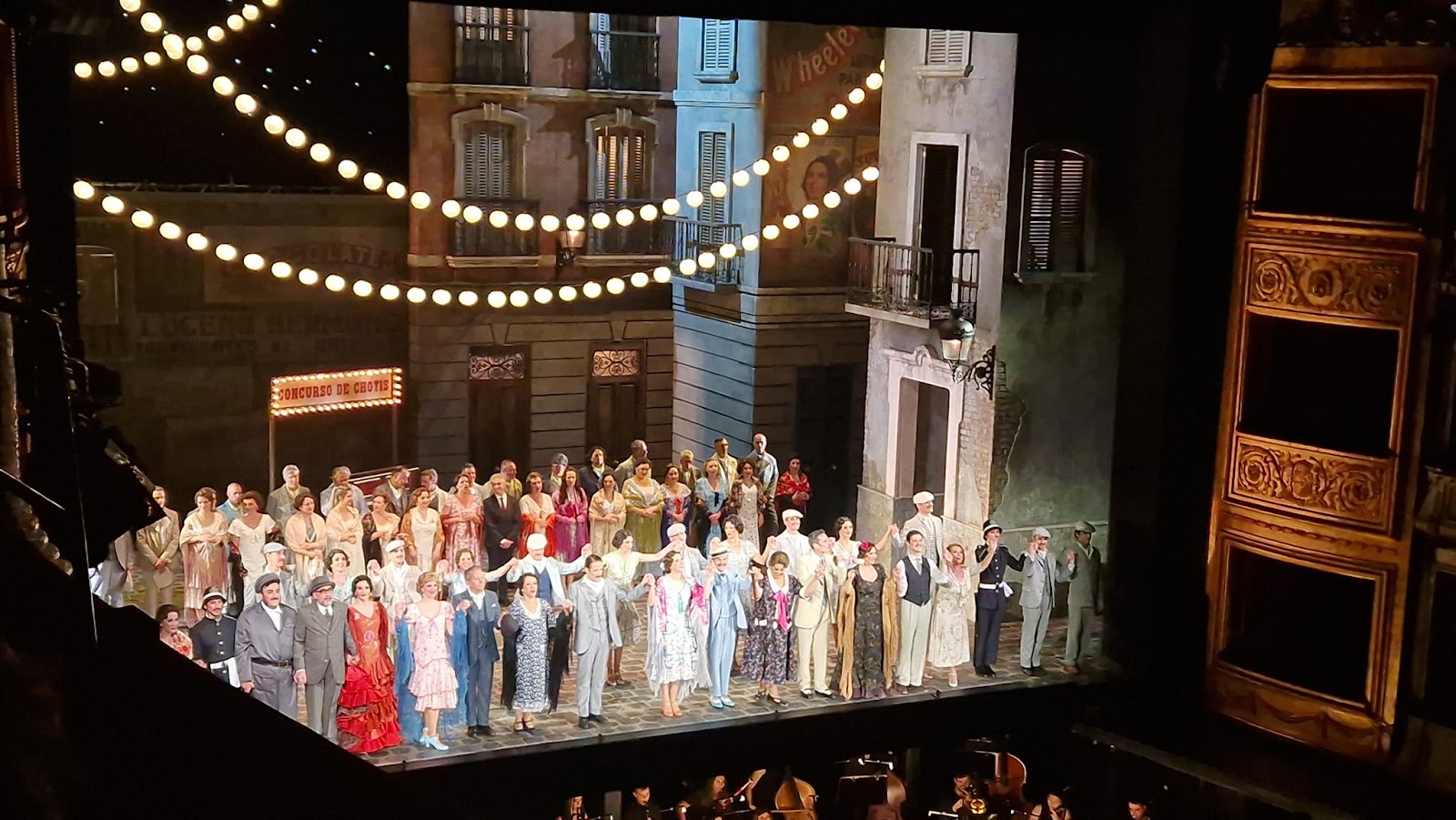Madrid, May 26, 2024.
May has been a month for joy in Madrid. Never before have we laughed so much about the lyrical scene: First, Wagner's Meistersinger at the Teatro Real, whose last performance took place last night, in a better rendition than the first ones, closing an already historic production, worldwide streamed, and hoping that it won't take another two decades until we see it again in our city. Then, the famous zarzuela La Verbena de la Paloma, by Tomás Bretón at the Teatro de la Zarzuela, a spectacular production that was a feast for the senses, and in festive days, as Madrid's day was near. And finally, Johann Strauss' Die Fledermaus at the Teatro Monumental, the classic Viennese operetta that always brings a smile with its cheerful music. However, Wagner's music has made a last cameo appearance at the Teatro Real.
"May Hella retain Ninna (sic) Stemme"
This is what Ángel Fernando Mayo, writer, critic and the most eminent Wagnerian in Spain in 20th century, wrote in a commentary on the Ring at the Bayreuth Festival in 1994, included in his reference "Guía Wagner" (still the main Wagner discography book in Spanish language), on Nina Stemme's performance, who sang the role of Freia in that production. Mayo passed away in 2003, and one wonders what he would have said if he had lived long enough to see Stemme's rise to stardom and become a leading Wagnerian performer.
Nina Stemme has been one of the leading Wagnerian sopranos of the last two decades. On stage since 1989, in 2003 she starred in a famous Tristan und Isolde production at the Glyndebourne Festival, and two years later, she sang Isolde at the Bayreuth Festival, and recorded the same opera on a studio set for the EMI label with Plácido Domingo, two events that definitely established her on the international scene. She has been one of the greatest performers of roles such as the aforementioned Isolde, Brünhilde, Turandot or Elektra. She has sung Brünnhilde in London, in Stockholm and with Barenboim at La Scala and in Berlin at the first Ring after the pandemic in 2021, among others. She recently bid farewell to the role of Isolde in Palermo. At the Teatro Real, she sang in a recital in 2009, and an unforgettable Salome in 2010 that remained in the memory of all those who saw it live. Since then she has not returned to the Teatro Real, despite having been announced to sing Turandot in 2018, but she was finally replaced by her compatriot Iréne Theorin. Accompanied by the maestro Gustavo Gimeno, future of the Teatro Real from 2025, she returns to Madrid for a recital entirely dedicated to Wagner, with excerpts from Tristan und Isolde and Götterdämmerung, very important operas in her career. In addition, the Teatro Real Chorus performed a rarity from the Wagnerian catalogue, "Das Liebesmahl der Apostel", a choral work.
This was the program:
PART I
Das Liebesmahl der Apostel
Tristan und Isolde: Prelude and Liebestod
PART II
Götterdämmerung:
- Dawn
- Siegfried's journey through the Rhine
- Funeral March
- Starke Scheite schichtet mir dort» (Brünnhilde's Inmolation)
Encore: "Träume" from the Wesendonck Lieder.
Stemme made her entrance in the first part, only to perform the Liebestod from Tristan und Isolde. Regarding that she is already past her prime, Stemme maintains her powerful vocal flow, even bigger than what she showed in her 2010 historical Salome, but the high notes were they were shouted, and the singing was too vibrant, despite her sensitive intonation.
However, everything changed when she appeared in the second part to sing the Brünnhilde's Inmolation, from another role that unfortunately she doesn't sing on stage anymore. Despite the aforementioned limitations in the treble, Stemme gave an exciting performance. Her stage presence, her mastery of the character, both in her authoritative presence and in the way she sings it, still maintaining the low voice, and even exquisite taste when singing the most intimate moments. From the first phrase, "Starke Scheitet mir dort" one noticed the authority she conveyed, as did some of her legendary compatriots who were great singers of the role in the past. In the most intimate moments, such as "Wie Sonne lauter strahlt mir sein Licht", the beautiful, dark middle register, merged into a tender singing, in which Brunnhilde complains of having been betrayed by Siegfried. From "Fliegt heim, ihr raben", the scene becomes more tragic because Brunnhilde prepares the pyre where she will thrown herself, Stemme sings in a passionate and spectacular way, given her mastery of the character, despite the high notes limitations, which were still better than those ones in the Liebestod.
Against all odds, since one would not imagine it after having sung such a scene, there was an encore: the beautiful "Träume" from the Wesendonck Lieder, which she performed deliciously and with a velvety-toned singing.
The Teatro Real Orchestra, very inspired after nine excellent performances of Die Meistersinger, was excellently conducted by Gustavo Gimeno. Excellent string sound in the Prelude to Tristan und Isolde, as well as in the first two interludes of Götterdämmerung. The excellent woodwind and brass sections of this orchestra shined in the second part, with the brilliant clarinet in the Prologue interlude and then in the Funeral March. As for the Finale, with the destruction of Walhalla, which is always exciting, moving to listen to, the orchestra took faster tempi, without enlarging the final flute note which usually gives a moving sensation. The Träume that was slow in tempi, but with a warm, delicious sound, as much as Stemme's performance.
The choir was the other protagonist of the evening, because the program included the spectacular, and rarely performed choral work "Das Liebesmahl der Apostel" (The Feast of Pentecost), which Wagner premiered in 1843, at the Frauenkirche in Dresden. This work is unique not only because of the enormous choir and orchestra it requires, but because the first half of it is sung a cappella. Despite its popularity, being in fact part of the male choral repertoire during the rest of the 19th century in Germanny, Wagner disowned this work. A pity, because it deserves to be performed very often. Although it may sound like a sacred choral work, it is actually a dialogue between the apostles and the disciples, who need the strength of God to spread His message in the world. This inspiration comes with a beautiful intervention by the tenors, representing God's voice, after which the orchestra finally intervenes, to show that apostles and disciples are now radiantly motivated, to fullfil their evangelizing mission. Musically it is reminiscent of Tannhaüser (which Wagner was composing at the same time) and Lohengrin at an orchestral level, but the a cappella part sometimes seems to announce the Grail scene from Parsifal. As expected with this great Teatro Real Chorus, the group was up to the task. Despite being located at the back of the stage, which took away a bit of their sound in the a cappella part, they managed to convey their powerful voices without accompaniment, in a somewhat religious experience. An interesting scenic effect took place during God's intervention from above, so well defended by the tenor section, the hall was illuminated, as well as the "sky" that is projected on the lamp from the beginning of this season. After the orchestra intervened, the choir was somewhat covered by it, but it resumed its spectacular sound at the end. A memorable intervention and another milestone in the career of this great choir, which I hope one day we will see again in this piece.
Big ovations were heard for Stemme after the Immolation, as well as for the chorus after the first part. Many of those who were in the room yesterday were usual operagoers, still remembering that 2010 Salome. It seems that Stemme is already in the final stage of her career, so she offered a beautiful rendition of the Götterdämmerung finale. So, thus finished a "Wagnerian" weekend, and Madrid has to say "goodbye" to Wagner for a while, since next season there is no performances of any of his operas, just a vocal recital by Michael Volle.


















